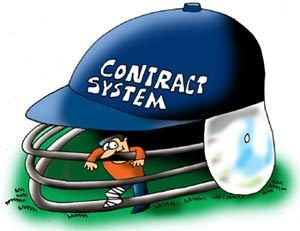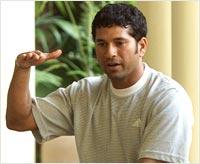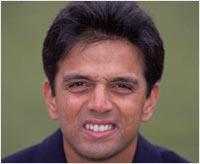United we stand
Faisal Shariff
"A player who is injured while playing for his national team deserves to be
looked after by the Board."
It is a thought that I have heard, from various players, over time. And
behind that thought lie words like security, regular pay packets, freedom
from the fear of being rendered hors d'combat.
In other words, they are talking of a contract system.
For a long time now, it has been just talk. And it has been off record. And
the Board of Control for Cricket in India has turned the proverbial deaf
ear.
So what has changed? Simply this: the demand is now on record. And official.
The players want contracts, and security, and are prepared to fight for it.

The contract system is just another form of ensuring security for the
players. If we have such a system, then I am sure the players will feel more
relieved, easier in their minds. He will know that even if something goes
wrong, he and his family will be looked after, so he won't be as scared to
take chances when playing."
That is Sachin Tendulkar, talking to rediff.com, on record.
And that is a first -- the first time a senior player is going on record, to
say something they have all been whispering about in the dressing room till
date.
Why are you here, talking to me?" Sachin asked, rhetorically. "It is
because it is your job and you are doing your job to look after yourself and
your family. If today you are injured, I am sure the company has some
provision to ensure that you don't starve. You probably have an ambition to
write well, like I have an ambition to score runs and win matches. We all
have our own ambitions, but deep down, the reason we do the work we do is
for security for ourselves and our family. And that is why it is important
for the players to feel that sense of security."
Sachin is not alone. Earlier this year, I was chatting with Anil Kumble,
when the question popped up. Anil gestured to his right arm, then swathed in
a sling, and said, If I tell you that you will be working on a
story-to-story basis, how would you feel? If you knew that you would be paid
only for the stories you write and get published, and that if you for some
reason couldn't work tomorrow and therefore wouldn't get paid, how would
that feel? I agree that cricketers are doing a job, that our job is to play
well, to entertain the fans. But does that mean we do not deserve to feel
secure? Suppose I tell you, tomorrow, that you have been picked to cover the
first Test of the series, and that I will tell you only later if you are
picked to cover the second and third Tests, how would you feel, not knowing
whether you would have a job or no?
"That is the situation we find ourselves in," Kumble says. And he adds, to
telling effect: "Suppose, at the end of the third day of the first Test, I
tell you that your work is not satisfactory and you will not be covering the
rest of the series, will your articles on days four and five be as good,
will you feel like giving of your best?"
Point made, and taken -- this, too, is about security.
Kumble, you realise as you hear him talk, will make a good advocate for the
team. He is reasonable, yet forceful, without needing to raise his voice to
make his telling points.
I think," he argues, "that it is very important to have a contract system,
because it gives you a lot of security. It tells the player what he will
earn that year, how much he will earn each month, and that ensures that he
doesn't waste his time worrying whether he will be picked for the next game,
or whether an injury will see him out of action.

"I think we all need the feeling of security. Take my case -- when playing,
I have done my best for the country. And then I got injured, and now I am
out. I don't get paid, I don't get any compensation. How do you think it
feels? When a player in this position starts playing again, it is natural
that he will be focussed on avoiding injury, more than on doing his very
best. And that is why the sense of security is so very important for us."
Another eloquent member of the team is Rahul Dravid, and he like Sachin and
Anil is all for a contract system to be implemented at the earliest.
However, Rahul warns that there is no point in blindly aping the Australian
or English models. A detailed study is needed, he says, to ensure that the
system put in place will be compatible with Indian conditions.
Besides India and Pakistan, every other Test-playing nation in the world
has a contract system. Even Bangladesh has a contract system for its
players," Dravid points out. "We are lucky in that we have readymade models,
like those of England and Australia, to study. What we need to do is study
those in detail, and that has to include a study of the players as well, to
make sure the system works for us."
But is this just another way for the seniors to ensure that they are well
looked after? For them to feather their own nests?
No, argues Rahul, pointing out that the senior players are in any case well
off financially. "This will really benefit the fringe players more than the
seniors," he argues. "It will give the fringe players the security they
need, it will help them take their minds off financial worries. He won't
have to worry about where the money for his next electricity bill will come
from -- he can, instead, concentrate on his cricket, just as you concentrate
on your work knowing that at the end of the month, a pay packet will come
along and take care of your needs."
Kumble has another slant on it. "If you have a bank of contracted players,
then the team can decide how to use them, depending on need. For instance,
there might be a time when a senior player has a slight injury problem. If
the team decides, then that player can skip a game and rest his injury,
rather than run the risk of playing and aggravating it. If he is on
contract, he will be comfortable with the thought of skipping a game, but if
he is not, then he will tend to hide his injury and play on -- and the long
term consequences of that will be felt by the team."
Kumble knows what he is talking about, here -- an injury aggravated by
playing on because the team needed him, has landed him in a situation where
he is now off through injury, with an uncertain future. And of course, the
BCCI has thus far shown no signs of paying his medical bills.

Meanwhile, the Board -- or sections of the board, to be more accurate -- is
also changing. Former president Raj Singh Dungarpur, for instance, admits
that while he was against the contract system initially, he is learning to
change his opinion.
I have changed, yes," Dungarpur tells me. "Earlier I was the first person
to oppose the contract system. But life is about being progressive, not
dogmatic. I understand the need for it, now, and I will be taking up the
matter with the board and insisting that the contract system be
implemented."
That is one school of thought, and it needs mentioning that when Dungarpur
openly states a view, it signifies that board president Dr A C Muthiah also
feels the same. There is, however, an opposing faction -- which is dead set
against the idea of a contract system.
One of the most vocal members of this faction is BCCI vice-president Kamal
Morarka, who argues that such a system will not work in India. "India has a
large pool of players to chose from, a contractual exercise can only end in
chaos and heartburn," he argues.
One problem, says Morarka, is for a player to become a contracted employee
of the board, he will have to quit the job he now holds -- remember that all
our national players are employed by one company or the other. "No player
will agree to do that," Morarka argues. "Besides, what happens if a player
loses form?"
These words signal the battle in the offing -- the players, versus the
faction within the board that is violently opposed to contracts.
Morarka's arguments sound genuine, but Dravid is quick to counter. "As per
existing laws, if I enter into a one year contract with the board, I do not
need to quit my job. And further, we do not need a contract that makes us
board employees -- one that pays us for services rendered is just as good. O
bviously, we will be taxed on this, but that is fine with us, not a
problem."
The objections raised by the anti-contract faction is in fact rooted in a
real fear -- that the board will lose the control it now has on the players.
The contract system doesn't make the BCCI any weaker," Dravid points out by
way of counter. "In fact, they will have more control over the players. They
can control whether a player plays county cricket, they can force us to play
domestic tournaments."
It is obvious that the issue is hotting up. The flashpoint will be reached
once the senior players band together and demand that the board implements
such a system -- and the signals we get are that the players are ready to do
just that.
It is important that we (the team) get together and decide on it," says
Sachin Tendulkar. "The board is, I understand, thinking of having a contract
system in place, I am sure something will come of it soon."
"It has to happen, sooner than later," argues Kumble. "I don't want to see
anyone else in the position I find myself in today. Srinath missed out four
years ago. Now I am missing out. I hope in the future, at least, no one else
does."
At another level, this is leading up to an interesting situation. Till date,
the reason the players have not been able to get what is due to them has
been a lack of unity. If Kumble is injured that is his problem, has pretty
much summed up the mood. Oh sure, there is sympathy among his fellow
players -- but not to the extent that the team is prepared to get together,
and get something done to remedy it.
The one big result of the recent series against Australia has been to change
this way of thinking. Now, unity is the buzzword within the team, the
players are prepared to come together, to fight together, both on the field
and, as in this instance, off it.
As for the contract system, Rahul Dravid has the last word on the subject.
It is the way ahead," says he. "The only way.
IIlustration: Uttam Ghosh
Earlier Reports
Terms of endearment - Faisal Shariff
Player contracts - Reader's opinion
Money Tree - Prem Panicker.
Of the players, by the players... - Faisal Shariff
A question of answers -- Prem Panicker
Mail
Faisal Shariff